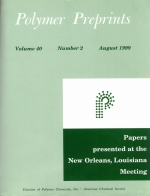"Atom Transfer Radical Polymerization of Vinyl Monomers Mediated by Stable Ruthenium-Carbene Complexes"
François Simal, Lionel Delaude, Dominique Jan, Albert Demonceau, and Alfred F. Noels
 |
source: Polymer Preprints
(American Chemical Society,
Division of Polymer Chemistry)
year: 1999
volume: 40
first page: 336
last page: 337
doi: not available
|
Abstract: We reported on the exceptional efficacy of new catalytic systems based on well-defined and fully characterized [RuCl2(p-cymene)(PR3)] complexes (p-cymene = 4-isopropyltoluene) to promote the controlled free-radical polymerization of vinyl monomers without cocatalyst activation. It appeared that only phosphines which are both strongly basic and which possess a well-defined steric bulk presented both high catalytic activity and high control of the polymerization process. The most suitable phosphines were triisopropylphosphine and tricyclohexylphosphine (PCy3, Cy = cyclohexyl). Surprisingly, the best catalyst systems for ATRP were also the most active ones for the ring-opening metathesis polymerization (ROMP) of cycloolefins. With this in mind, [RuCl2(=CHPh)(PCy3)2], the Grubbs' ruthenium-carbene complex commonly used for olefin metathesis, was tested and found to be also highly efficient for ATRP. In this paper, we present some studies on the scope and limitations of stable ruthenium-carbene complexes as potential catalysts for the ATRP of vinyl monomers.
[<< Previous Proceedings] [Back to the List of Publications] [Next Proceedings >>] l.delaude@ulg.ac.be